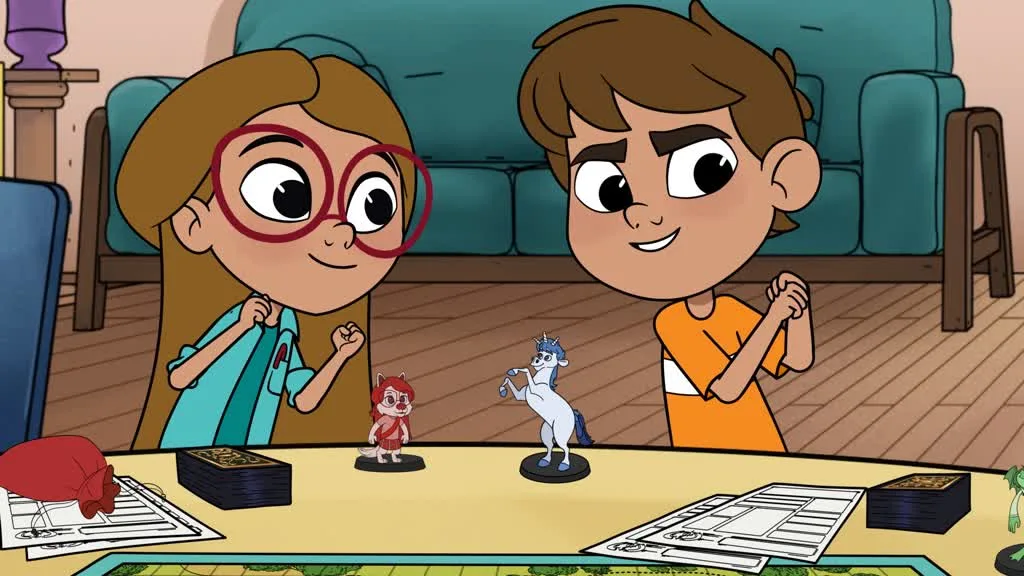Lessons of Tuttle Twins: Government Help
When a recession hits and their family’s café is affected, Ethan and Emily discover the dangers of surrendering powers to the government when danger arises. Run-ins with mythical creatures, including an actual Leviathan, as well as a visit with President Calvin Coolidge teach the twins just how precious our freedoms are.
Tuttle Twins follows clever twins Ethan and Emily Tuttle, their time-traveling grandma, and the rest of the gang on madcap adventures during which they learn precious truths about freedom, economics, and more.
In the show’s tenth episode, entitled “Roll for Power”, Ethan and Emily learn that though calamities can be scary, surrendered freedoms are rarely given back.
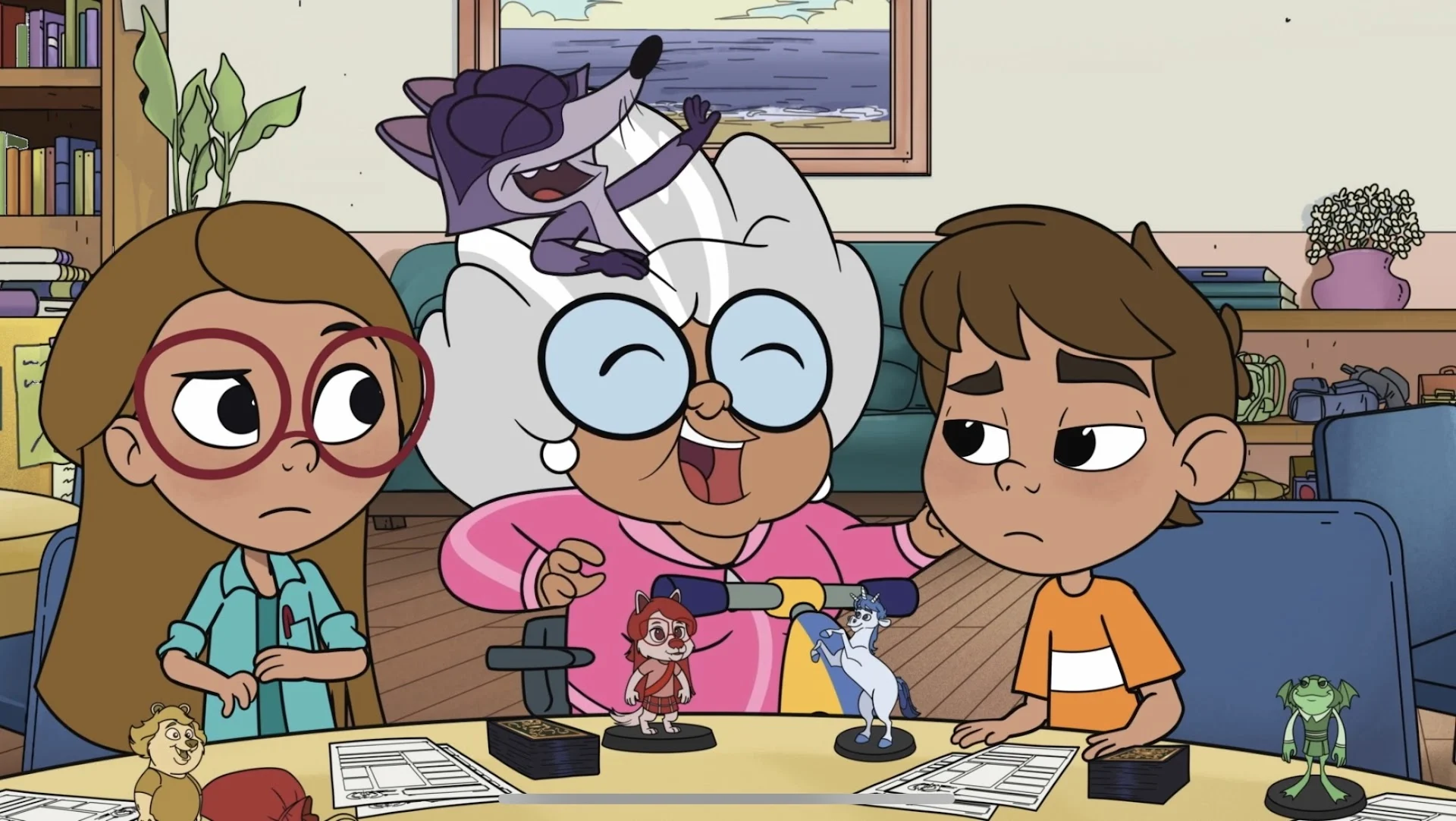
Episode 10: “Roll for Power” Synopsis
The episode opens with a narrated adventure, starring the Tuttle Twins gang. They’re not as we know them; however, Ethan, Emily and their friends are anthropomorphic mythical creatures.
The group arrives at a strange cave, which they soon discover to be the mouth of a dangerous dragon that breathes out white-hot fire.
We shift back to reality, and the gang is playing a mythical role-playing board game, Creatures & Crisis. Ethan, Emily, and friends are trying to conquer the game’s dragon, and Karinne offers a solution: her Leviathan card can slay the dragon, but all the players need to surrender one of their power tokens in exchange for the protection. They hesitantly oblige, Karinne vanquishes the dragon, and the quest lives to see another day.
When the game is over, the kids ask Karinne for their power tokens back, but she replies with the card’s one condition: “The Leviathan can keep the power if she wants, in case the danger emerges again.”
Ethan complains that he worked hard for the token, and now needs to start over. Karinne tells Ethan that they don’t need their power tokens, now that her Leviathan can defend the group from any threat that comes their way.
“Maybe it’s not bad to sacrifice a little power so we can be safe,” Emily remarks. Ethan reluctantly agrees.
Trina the gamemaster (as well as the barista at the Tuttles’ café) gets up to leave and announces that Mr. Tuttle has had to cut back on her hours at the café due to the recent recession. The twins reassure their dad that his hairline is fine, prompting him and Trina to teach them about economic recessions: they explain that the economy is hurting, people are spending less money, and that’s why Mr. Tuttle needs to cut back on employees’ hours.
“Don’t worry,” Karinne chimes in, announcing that her dad says the city council is meeting tonight and wants to give all the town’s businesses free money.
“Money from the government is never free,” Mr. Tuttle warns. “They’re proposing a new local government department, which will give out ‘free’ money, which ends up being paid for by our community. [I] plan to speak up. Sometimes, the medicine is worse than the disease.”
“And sometimes the medicine is yummy!” Karinne refutes. "As father always says, ‘the government has never done anything wrong in the history of forever’ and ‘stop asking me questions, it’s poker night!’” Karinne wipes away a tear, and the group awkwardly ignores that last part.
Distressed, Ethan and Emily talk about how much they love Trina and would hate to see her lose her job at the café. “Maybe Karinne is right,” Emily suggests. “If the city council doesn’t step in, Trina could lose her job.”
“Maybe, just this once, we could try and get some government help,” Ethan agrees.
Grandma Gabby appears, chuckling at Ethan’s use of “government” and “help” in the same sentence, and whisks them away on a time-traveling adventure.
Karinne sees them about to fly away on Gabby’s time machine and, in an attempt at sabotage, tries to snap a picture of them, but Copernicus leaps in the frame and the gang flies away.
The twins ask Gabby where they’re headed. “I have a hankering for something that’s not legal in our day,” Gabby responds. The next thing they know, the gang is in Washington, D.C. in 1926, in line at a stand selling raw milk. Emily exclaims her excitement to be in the Roaring 20s.
Gabby informs the twins, to their disbelief, that the US has just gotten over a recession at this point in the 20s. Emily explains that she’d never heard of said recession. This recession’s quick end, as the twins will soon learn, is thanks to President Calvin Coolidge. The twins discover they’re in front of the White House, and Calvin Coolidge joins them. His pet raccoon, Rebecca, is draped over his shoulder, and Derek is instantly smitten.
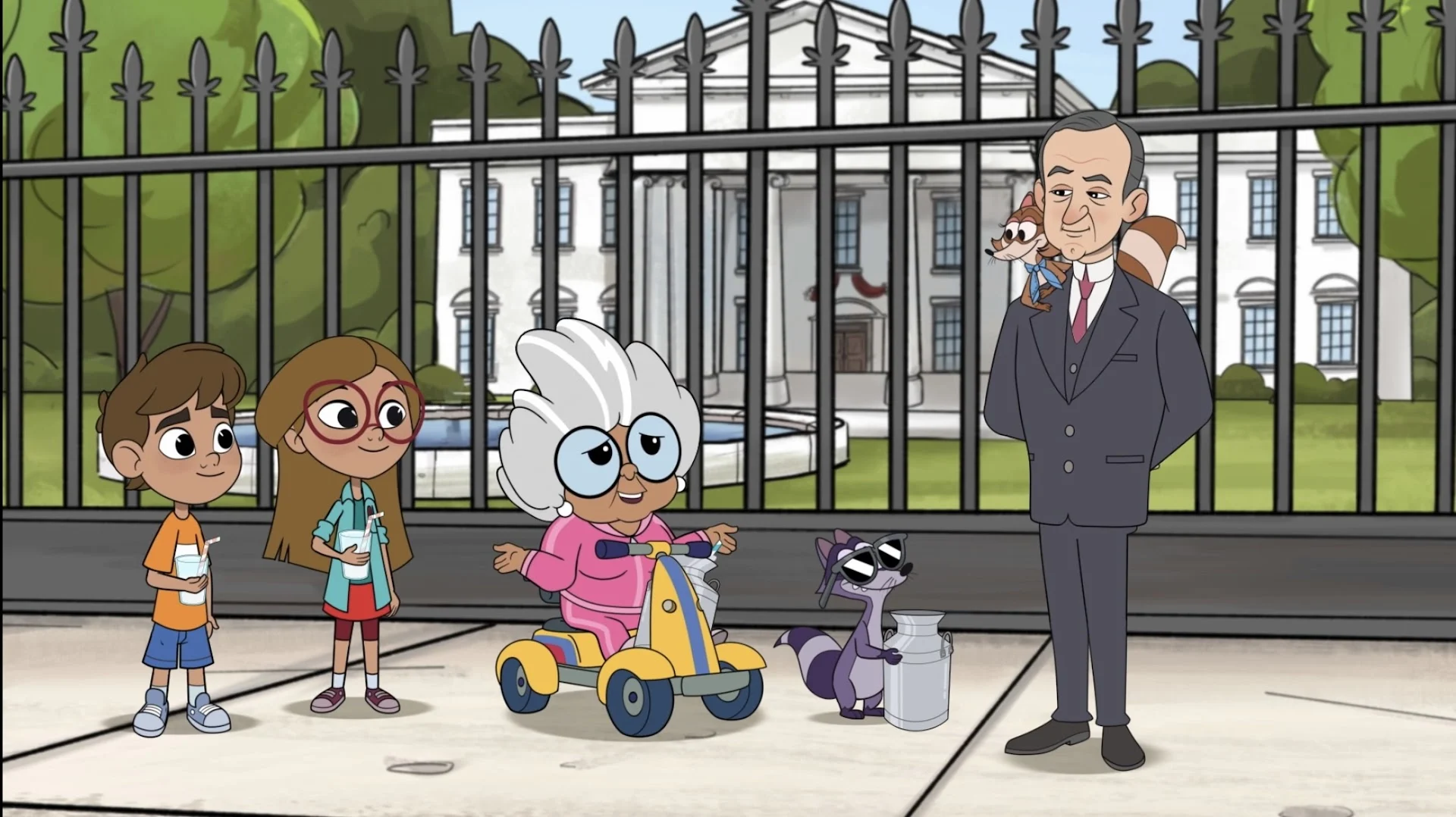
The twins ask Coolidge how he—and his adorable pet raccoon—fixed the recession. Coolidge explains that the recession occurred when he was a newly elected vice president. The citizens were scared of the time’s financial upheaval and begged the government for bailouts. Coolidge knew, however, that “if the government were to grow and solve the problem [then], it would lead to many more problems [down the road].” When Emily asks who fixed the crisis, Coolidge responds that the people did. “We cut taxes and spending, and with more of their own money in their pockets, the people repaired the economy themselves.”
“You didn’t help anyone out?!” Emily asks in shock.
Coolidge replies that it was tempting to bail people out. He compares the government, however, to a Leviathan, which prompts Ethan to ask excitedly if he plays C&C. Coolidge responds that he doesn’t, and explains that the government is like the monster Leviathan, which grows to an uncontrollable size when fed.
The twins are still a bit confused. What if citizens grow the government, they ask, to accomplish something good, such as to help a friend (or a really good C&C master)?
President Coolidge explains that if you want the government to solve your problems, you have to surrender your power. When you do, they’re very hard to get back. In essence, “giving in to fear makes your power disappear.”
“That’s why we keep our government small,” Coolidge explains.
“That’s why we used to do that,” Gabby clarifies, to Coolidge’s shock and dismay.
“This sounds a lot like those scary sci-fi books you let me borrow!” Coolidge exclaims.
“Those were called history books,” Gabby responds.
The gang takes Coolidge on a tour through the pages of said history books, visiting New York in 1929 to see the poor lining up for food. The people here were in the midst of another recession; this time, however, the government decided to step in. Gabby chimes in and notes that many scholars agree it was this government involvement that turned this particular recession into the Great Depression.
During the Great Depression, millions lost their homes and jobs, leading to widespread fear. The government responded by taking more power and creating the New Deal. They regulated what farmers grew, the prices of goods and services, and the wages of workers, and even banned people from owning gold.
“Doesn’t the government give the power back when the crisis is over?” Ethan questions.
“No,” Coolidge responds. “That’s the problem with the Leviathan: the more power you give it, the more power it keeps. The Leviathan grows bigger and bigger with each crisis.”
The team continues on through the history books. During WWII, they learn—because of the war’s increasing cost—the government created more military programs. They didn’t get rid of them after the war; however, the government just changed the programs’ names and kept charging the taxpayers for them.
A terrorist attack led to increased intelligence operations, which enabled the government to spy on us citizens: not just during a crisis, but all the time. A viral pandemic led to many businesses being closed permanently, due to heavy government regulations. With each crisis, people have gotten scared and surrendered their freedoms to get help from the government, making the monster bigger. Each threat and disaster led to a bigger Leviathan of a government and, as a result, today’s government is over five times bigger than it was when Calvin Coolidge was a kid.
“A monster this big doesn’t have to serve you if it doesn’t want to,” Coolidge reminds the twins.
Emily’s getting nauseous at this point, and Gabby suggests that the raw milk may be the culprit.
“But Grandma, you said it was safe!” Emily exclaims.
“I never said it was safe. Freedom has real risks,” Grandma Gabby remarks.
“But trading freedom for security rarely turns out how people want,” President Coolidge adds. The gang leaves the history book and falls back onto Pennsylvania Ave.
Ethan attempts to summarize what the group has learned: “So, the government can’t do any good and we should overthrow it?” His suggestion is met with great zeal by weapon-wielding Derek and Rebecca but is declined by Coolidge, who explains that the government can do a lot of good, like protecting our rights, but just needs to be kept in check.
How can citizens keep the government Leviathan from getting bigger? Ethan and Emily are starting to understand: we give people the truth and let them use their own power to solve problems. Amid the epiphanies and philosophizing, Derek swoons at a romantic gift from Rebecca and accidentally falls onto the “ironically convenient plot twist button.”
When Ethan and Emily come to, they find themselves in a village of anthropomorphic sheep, and they’ve become fantastical creatures as well. The pair realizes that they’ve found themselves in C&C, and a monster has just shown up.
The twins cry for Grandma Gabby, but she’s watching the game board helplessly from the café.
Derek is too busy staring longingly at Rebecca’s gifted neckerchief to help the situation.
Ethan and Emily need to learn enough to fill the knowledge tank on Gabby’s wheelchair time machine, and then she’ll be able to use that power to zap them back into the real world.
Gabby warns Derek not to knock Karinne’s Demafrog figurine into the game, but he does anyway. Things have now become a little more complicated.
With their backs against the wall, the twins resolve not to give in to fear. Moments later, Demafrog Karinne arrives, vows to save the day, and brings her Leviathan. He’s armed with the group’s power from their tokens, but it proves not to be enough to defeat the monster.
Demafrog Karinne is growing frustrated. “Sheeple, give the Leviathan your power or be destroyed!”
Ethan warns the sheeple that this strategy won’t work. “When you grow a Leviathan, it almost never shrinks back down!”
The sheeple are terrified and unconvinced. “We’ll give you what you want, just save us!”
The twins’ and sheeple’s power feeds the Leviathan. They become smaller and weaker, and he grows bigger and stronger. A single flick of the Leviathan’s tail defeats the monster, but he doesn’t stop there; he eats Demafrog Karinne and comes after the twins next, crushing everything in his path and devastating the sheeple village.
Drawing upon Coolidge’s teachings from earlier, Ethan proposes they empower the villagers to defeat the Leviathan using their own strength and resources. Before they can act, the Leviathan breaks into the silo in which they’ve found shelter, and the structure shakes while the sheeple flee.
“With a crisis, people give up freedoms because they’re scared, and that makes the government’s power grow bigger!” Emily teaches the cowering sheeple.
“Once a government program is created, it doesn’t go away easily!” Ethan chimes in.
With these declarations of newfound knowledge, Ethan and Emily gain some power back and grow bigger again.
“They’re right,” one of the sheeple admits. “We have the power to solve our own problems!” Growing more and more confident in their power and ability, the sheeple grow stronger and bigger as well.
With a final battle cry from Ethan, the villagers form a massive mega-sheep, wearing the demolished silo as a suit of armor.
“Don’t give into fear! You can take back your power!” The twins encourage, and the sheeple gain the advantage. With a burst of inspiration, the giant sheep grows horns and defeats the Leviathan with just a few blows.
The twins are suddenly returned to the real world. It’s 5:30, and Grandma scoops them up just in time to scurry to the city council meeting. Mr. Tuttle is arguing with Karinne’s dad, who threatens that the town’s local businesses will have to start firing people if the government doesn’t give out more money. Karinne’s father asks to be appointed as the head of a new economic stimulus department, promising to give out any money that local businesses need.
“Without the government, we’re powerless,” he warns, just before Ethan and Emily burst into the council chambers to prove him wrong.
“We’re only powerless if we give our power away,” Emily declares.
A concerned citizen stands and admits he’s scared. “If the government doesn’t help us through this crisis, who will?”
“We’ll help each other,” Ethan suggests.
“We, as a community, are so much better at solving our own problems than the government ever could be,” Emily says. Mr. Tuttle and the twins ask various citizens in attendance how long it took the government to solve their respective recent issues. In each scenario, the government’s help took months on end, while local citizens and churches solved the same problems in a snap. “It’s not the government who will save you in a crisis, it’s the people around you,” Emily states.
Karinne interjects that the community’s help may not meet approved standards. Ethan replies that it may not but explains that, though crises are hard, giving power to the government only makes things harder. Emily adds that giving in to fear makes our power disappear. Sometimes the medicine is worse than the disease.
The city council sides with the Tuttles against Prop 20, rejects the stimulus, and motions that the community can handle the effects of the recession themselves. The citizens in attendance immediately get to work helping each other with their issues.
Back at the café, the twins have an idea for how they can help Trina keep her job: they set up Creatures & Crisis tournaments in the café, advertise them to their friends, and Mr. Tuttle gives Trina a new way to get her hours: as gamemaster for the town’s C&C lovers.
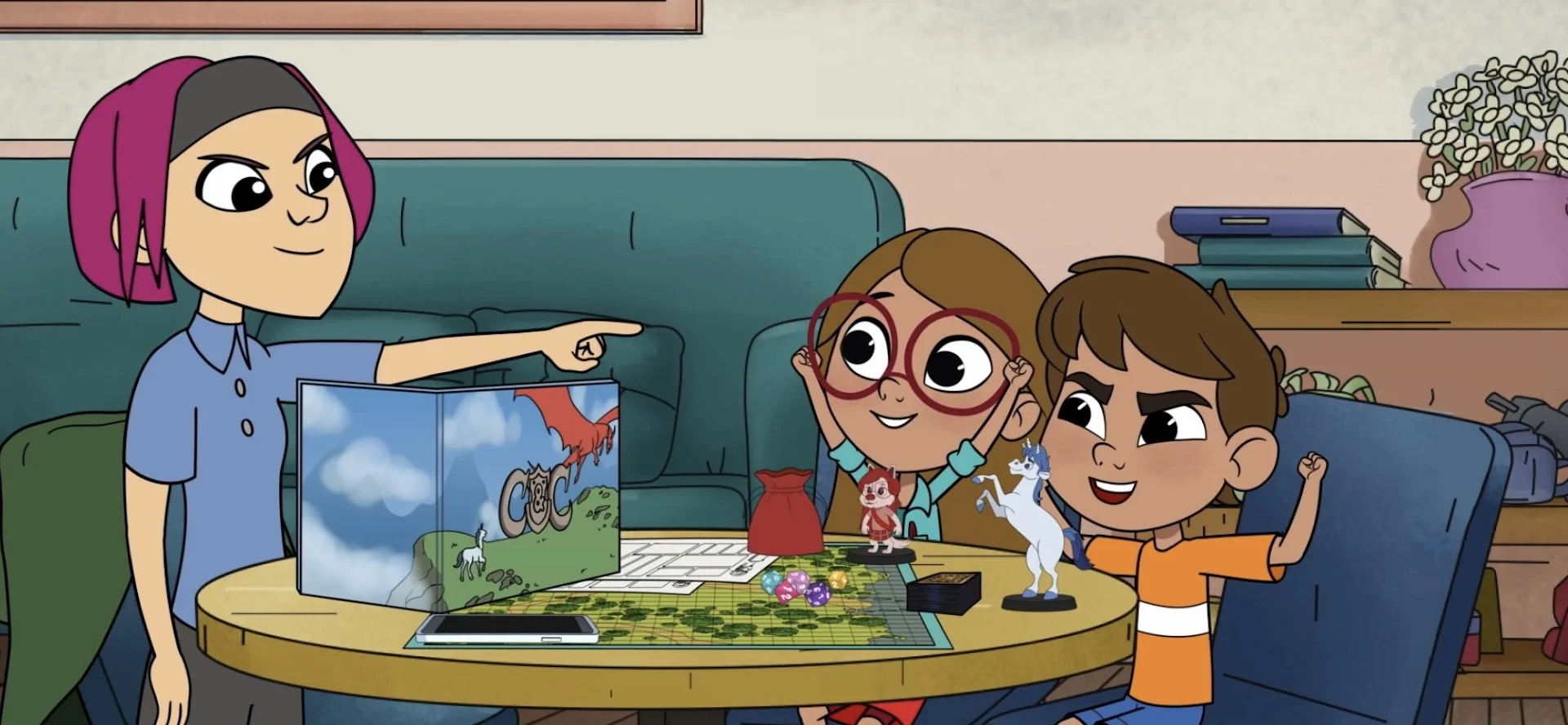
What Did We Learn in “Roll for Power”?
When a recession threatens the jobs and businesses of their family and friends, Ethan and Emily discover the perils of surrendering one’s power and freedom to the government. President Calvin Coolidge, as well as the gang’s favorite mythical board game Creatures & Crisis, help to teach them several key lessons about the value of freedom.
When Karinne makes it sound all too appealing to seek help from the government during the recession, Grandma Gabby takes the twins to the Roaring 20s to meet President Calvin Coolidge. President Coolidge shares his experience of a recession plaguing the country during his vice presidency, and how he resisted the urge to institute handouts and instead empowered the citizens to keep their freedoms and solve the problem themselves.
The twins and their friends are avid players of a mythical board game, Creatures & Crisis. When the team starts to lose to a monster (in gameplay, as well as in a terrifying turn-of-events in which the game becomes reality), the twins surrender their freedoms to Karinne, only to learn that such protection is rarely enough and that surrendered freedoms are tough to get back.
Overall, the twins eventually learn that fear can generate a desire to give up freedoms in exchange for protection, but that it only feeds the government monster and makes it uncontrollable.
Be Like Ethan & Emily
Times of calamity can be truly scary. Recessions, pandemics, and threats of all kinds can tempt us to allow the government to step in and assist in exchange for seemingly insignificant freedoms. However, just like the twins learned from Calvin Coolidge and their time with the Leviathan, surrendering freedoms not only rarely leads to effective protection, but those freedoms can also easily disappear forever. Citizens can use their power to solve problems without the government’s help.
Parents, you can teach your kids how to preserve their freedoms against government overreach. Help them notice and navigate the potential ways government “help” may be a wolf in sheep’s clothing.
How can you teach your children the importance of preserving freedoms during times of crisis?
Discuss current and recent events in which the government offered protection in exchange for the freedoms of citizens, businesses, churches, and more. Examine the results that came to those who agreed to make the trade.
Explore historical topics, such as the Great Depression and New Deal, that illustrate the importance of retaining basic freedoms.
Study the Bill of Rights. Point out the practical application of each right contained in the document, brainstorm potential ways that the government may try to infringe upon each right, and create actionable plans for each scenario.
Tuttle Twins teaches essential truths on freedom, citizenship, and more, in a way that entertains and inspires. Use the lessons taught in each episode to spark meaningful discussions with your family.
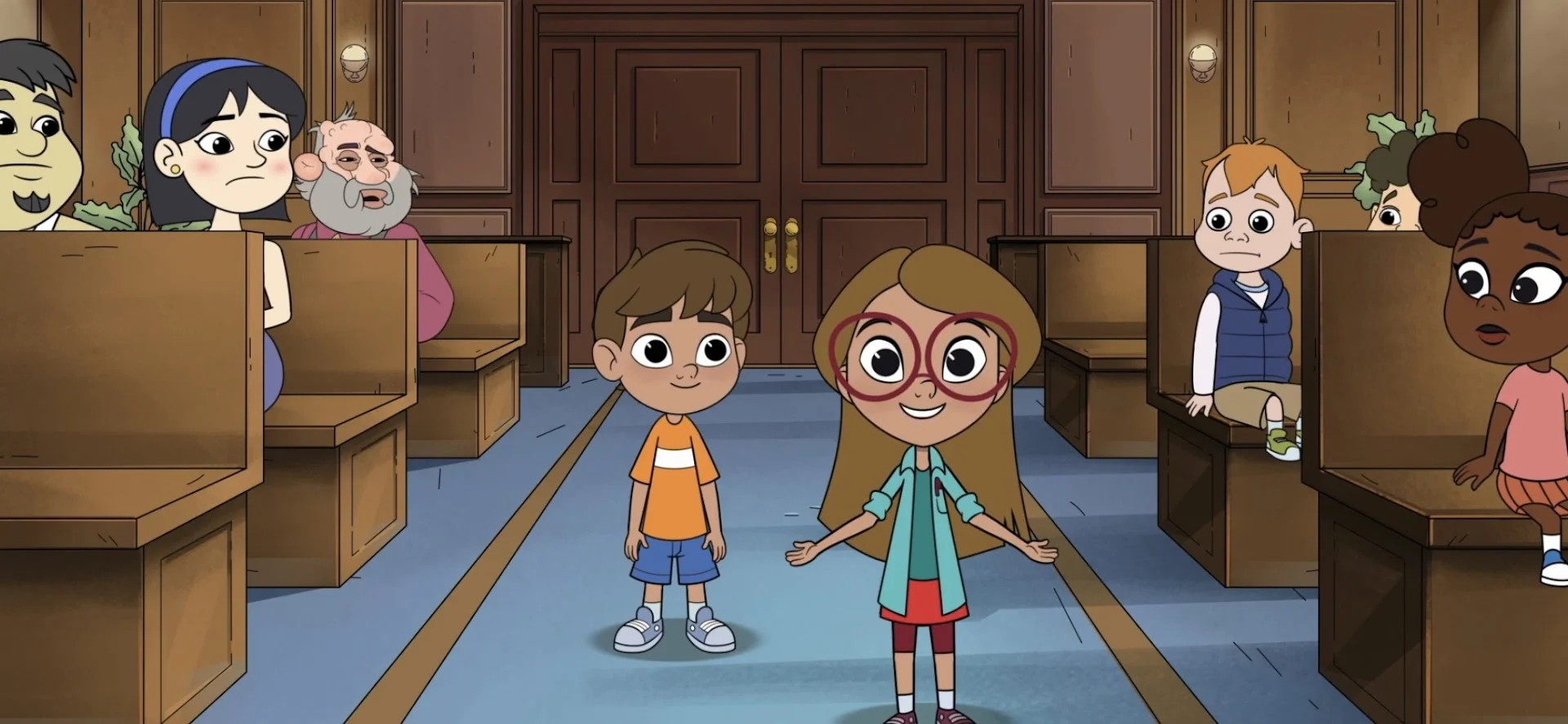
Support Tuttle Twins
Tuttle Twins is one of the only children’s shows that speaks on essential issues while entertaining all audiences with clever writing and exciting escapades. Are you eager for more of the Tuttle gang’s zany adventures? Watch the next episode—the second to last of the first season—entitled “Free Speech Freestyle.” Neighborhood tyrant Karinne is spreading vicious lies about Ethan. With the help of Founding Father James Madison, the twins go on a journey to discover the dangers of restricting free speech, even when it’s mean, unfair, or flat-out untrue.
There are so many Tuttle adventures to enjoy! You can stream the first two COMPLETE seasons of Tuttle Twins for FREE on the Angel app.
Help make more episodes and seasons of Tuttle Twins. Pay it Forward today to help bring this clever show and its important messages to the world.
Rep your love for Tuttle Twins with clever, vibrant merch inspired by your favorite characters. Discover Tuttle merch you can wear, watch, snuggle, and read.
Únete al Angel Guild para descubrir una narración maestra.
Ayuda a transformar la industria.
Tu membresía contribuye directamente a la producción de programas como Tuttle Twins, permitiendo a los cineastas contar más historias que aumentan, entretienen y amplifican la luz.
